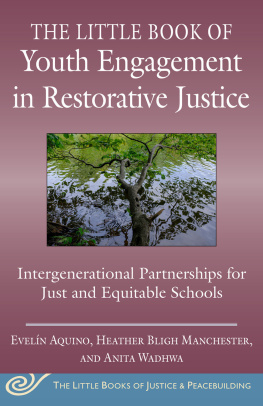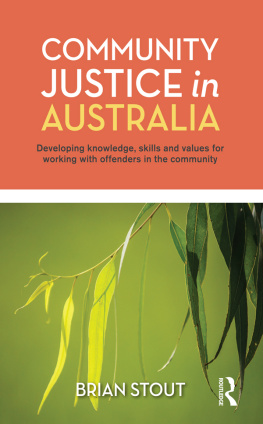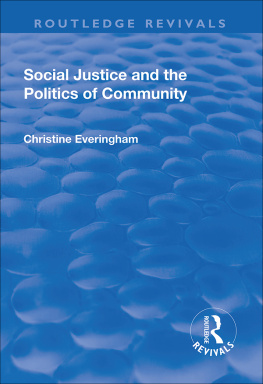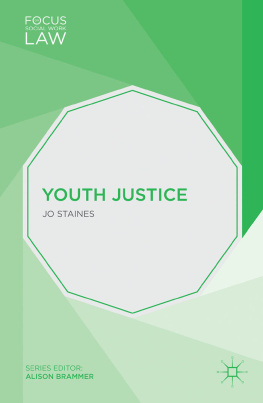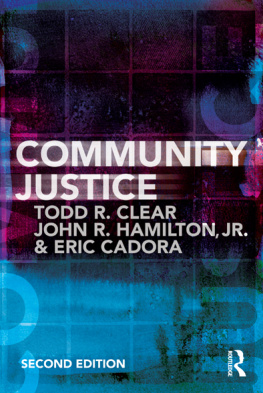Goddard and Myers are two of the most original academic activists working in the fields of youth and community. In this long-awaited book they examine the potential, the challenges and the enemies of alternative youth justice interventions aimed at raising individual and community consciousness of the relationships between poverty, racism and neoliberal carceralism. Like the US programmes Goddard and Myers describe, their acute analyses are revolutionary, timely and inspirational contributions to struggles for social and criminal justice.
Professor Pat Carlen, Open University, UK
Youth, Community and the Struggle for Social Justice
Activists, policymakers, and scholars in the US have called for policy reform and evidence-based efforts to decrease the number of people in jail and prison, improve hostile policecommunity relations, and rollback the tough on crime movement. Given that poor people, particularly poor people of color, make up the majority of those under carceral control in Western, industrial countries, can technical solutions, gradual reforms, and individual-level programming genuinely change the deeply entrenched carceral state that has been expanding in the US for over 40 years?
In this book, the authors offer an examination of the creative ideas that twelve US-based social justice organizations put forward for how participation in social change might spur not only individual-level change in young people, but community-wide mobilization against the harms resulting from the tough on crime movement and neoliberal policy. Using alternative programs grounded in political and social consciousness-raising, these organizations provide important and novel methods for how we might roll back carceral expansion. Their approaches resonate with scholarship in criminology and related fields; however, they sharply contrast with popular notions of what works. The authors detail how community-based organizations must navigate not only these scientific forces, but the bureaucratic and financial ones consistent with neoliberal governance as well as the more formidable, less navigable political barriers that activate when organizations mobilize young people of color for social and carceral reform.
While aware of the formidable barriers they face, the authors highlight the emancipatory potential of community-based social justice organizations working with the most marginalized young people across several major US cities. Written in an accessible way, this book will be of interest to scholars, students, progressive policymakers, practitioners, and activists and their allies who are deeply troubled by the class and racial disparities that pervade the carceral state.
Tim Goddard is Assistant Professor of Criminal Justice at Florida International University in Miami, USA.
Randy Myers is Associate Professor of Sociology and Criminal Justice at Old Dominion University in Norfolk, Virginia, USA.
Routledge Studies in Crime, Security and Justice series
https://www.routledge.com/Routledge-Studies-in-Crime-Security-and-Justice/book-series/RSCSJ
Social scientific scholarship is being transformed by the challenges associated with the changing nature of, and responses to, questions of crime, security and justice across the globe. Traditional disciplinary boundaries in the social sciences are being disturbed and at times broken down by the emerging scholarly analysis of both the increasing merging of issues of crime and security and the unsettling of traditional notions of justice, rights and due process in an international political and cultural climate seemingly saturated by, and obsessed with, fear, insecurity and risk. This series showcases contemporary research studies, edited collections and works of original intellectual synthesis that contribute to this new body of scholarship both within the field of study of criminology and beyond to its connections with debates in the social sciences more broadly.
Policing European Metropolises
The Politics of Security in City-Regions
Edited by Elke Devroe, Adam Edwards and Paul Ponsaers
Police Work and Identity
A South African Ethnography
Andrew Faull
Youth, Community and the Struggle for Social Justice
Tim Goddard and Randy Myers
First published 2018
by Routledge
2 Park Square, Milton Park, Abingdon, Oxon OX14 4RN
and by Routledge
711 Third Avenue, New York, NY 10017
Routledge is an imprint of the Taylor & Francis Group, an informa business
2018 Tim Goddard and Randy Myers
The right of Tim Goddard and Randy Myers to be identified as authors of this work has been asserted by them in accordance with sections 77 and 78 of the Copyright, Designs and Patents Act 1988.
All rights reserved. No part of this book may be reprinted or reproduced or utilised in any form or by any electronic, mechanical, or other means, now known or hereafter invented, including photocopying and recording, or in any information storage or retrieval system, without permission in writing from the publishers.
Trademark notice: Product or corporate names may be trademarks or registered trademarks, and are used only for identification and explanation without intent to infringe.
British Library Cataloguing-in-Publication Data
A catalogue record for this book is available from the British Library
Library of Congress Cataloging-in-Publication Data
A catalog record for this book has been requested.
ISBN: 978-1-138-21000-4 (hbk)
ISBN: 978-1-315-45621-8 (ebk)
Typeset in Bembo
by codeMantra
Our deepest debt of appreciation is to the individuals who agreed to participate in interviews for this research but who remain unidentified here for reasons of confidentiality. We feel grateful for and humbled by their willingness to open up their doors to us, give us their valuable time and share their important work with uswith nothing expected in return. It was a great privilege to have learned about what these people do and we remain inspired by the work they have done and continue to do today.
We also wish to recognize the scholars who influenced our approach, reflections, and arguments while writing this book. These people include Gordon Hughes, Simon Winlow, Steve Hall, Kelly Hannah-Moffat, John Muncie, Jo Phoenix, Joshua Page, Philippe Bourgois, Patricia Gray, Barry Goldson, Roger Matthews, Marie Gottschalk, Joanne Belknap, James DeFilippis, Alexandra Cox, Ruben Miller, Tony Platt, Lisa Miller, Michelle Alexander, Michael Tonry, Fergus McNeil, Sonya Goshe, Travis Linnemann, Geoff Ward, Robert Werth, and Judah Schept, as well as the late Kenneth Clark, Stanley Cohen, and Jock Young. We would also like to thank our respective departments at Florida International University and Old Dominion University for their continuous support. We also are grateful to the scholars who supported us along our journey as students and beginning professors (and maybe saw something in us that we did not), including Pat Carlen, Susan Bibler Coutin, John Davidtz, Cheryl Maxson, Valerie Jenness, Mona Lynch, Ruth Triplett, George Marcus, Joan Petersilia, Dawn Rothe, David Ring, John Dombrink, Carroll Seron, Susan Silbey, Lisa Stolzenberg, Mona Danner, Susan Turner, Sara Wakefield, and Diego Vigil. A very special thank you is due to Elliott Currie for his guidance, friendship, and unwavering support over the last eleven years.



